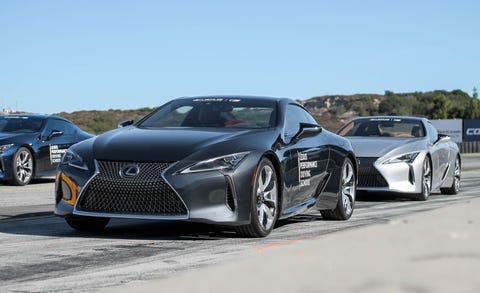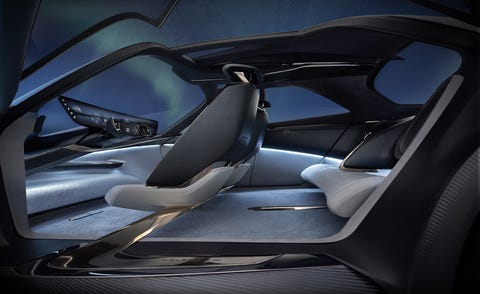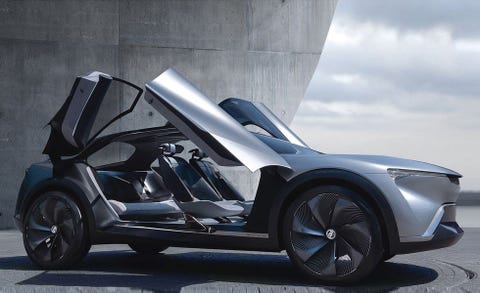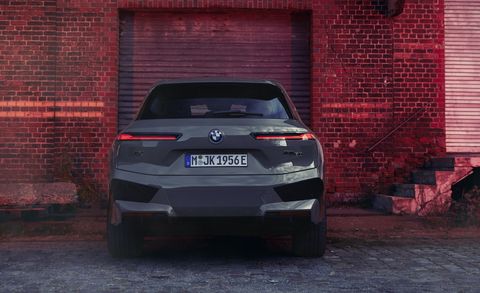Vehicles 136
BMW iX M60 Is a Sporty SUV with 800+ LB-FT of Torque
- BMW has revealed a performance version of its iX electric SUV, the iX M60.
- The M60 can produce up to 610 horsepower and 811 pound-feet of torque, sending it to 60 mph in a claimed 3.6 seconds.
- Air suspension comes standard on the M60, and the performance trim gains optional 22-inch wheels and blue, M-branded brake calipers.
BMW’s M performance brand is preparing for the future. After launching the i4 M50—the first electric BMW to don an M badge—last fall, BMW has turned up the wick on its new electric SUV to create the iX M60. Although there is little to visually distinguish the M60 from the standard iX, the new performance variant receives a dollop of extra power and oodles of standard equipment.
Like the 516-horsepower iX xDrive50, the M60 is all-wheel drive with an electric motor on each axle. With Sport mode activated, these motors now churn out 610 hp, and with Launch Control engaged there is 811 pound-feet of torque on tap. These potent numbers fire the 5769-pound iX M60 to 60 mph in just 3.6 seconds, according to BMW, before topping out at 155 mph.
While adaptive air suspension is an option on the xDrive50 model, it comes standard on the iX M60, paired with a double-wishbone setup up front and a multilink suspension at the rear. The air suspension features electronically controlled shock absorbers and can adjust its height depending on speed and load on each individual wheel. The height can also be controlled via a button on the center console, and the drive modes alter the damper mapping to adjust the handling and ride quality.
Design changes are subtle. Blue, M-branded brake calipers peek out behind available unique 22-inch wheels, and there are black M logos on the rear hatch. Lots of interior goodies come standard, including BMW’s speech and gesture control system, a Bowers & Wilkins surround sound system, and a heated steering wheel and seats.
On the standard 21-inch wheels, BMW says the iX M60 will travel 280 miles, a slight dip from the xDrive50’s range. (No figure was announced for the 22-inch wheels.) The iX M60 will start at $106.095, about 20 grand more than the xDrive50 model, when it goes on sale in the United States this June.
Why Attending a Performance Driving School Is Worth It
If you’re planning to take your car to the track or already regularly attend track days, a performance driving school can help you improve your skills by learning from professionals. Some automakers offer these programs—three Car and Driver editors just attended schools with BMW, Porsche, and Lexus—and there are other options, too. C/D staffers have also gone to schools such as the Bridgestone Winter Driving School, the Radford Racing School (previously Bob Bondurant School of High Performance Driving), and the Ron Fellows Performance Driving School
These schools offer similar programs with anywhere from one- to multi-day schools covering things like car control, cornering techniques, and timed laps. Attending an automaker’s own program is especially beneficial if you own one of its vehicles, but you don’t have to be an owner to get a lot out of the experience. We’d suggest attending a two-day program for the most in-depth experience, but start where you can.
One-day schools are generally more affordable and meet a range of driving interests and needs. For instance, winter-driving safety and performance programs from Bridgestone start at only $309; the Skip Barber Racing School has a Roush Performance Intro to Racing four-hour course for $1195; and the Radford Racing School has a one-day performance driving class for $1899. Expect pricing in the $3000 to $4000 range for the two-day schools described below, with prices going higher as the level gets more advanced.
Our staffers share their recent experiences with three automakers to help you decide if attending a performance driving school is worth it. Spoiler: it is.
BMW Performance Center West
Approaching a corner doing 100-plus mph and looking out the driver’s window at the apex while simultaneously mashing the brake pedal is tough to get used to. At the BMW Performance Center’s two-day M school, instructors constantly reminded us that a driver’s vision is the most important aspect of track driving. This and other directions learned during classroom sessions are practiced on multiple sections of track, starting with lead-follows, using the Performance Center’s onsite autocross course and the Thermal Club raceway south of Palm Springs, California.
“Eyes up,” the instructors would routinely tell us over the radio. They were stationed at various points giving instructions and feedback. In this course, we learned behind the wheel of BMW M2, M3, and M5 Competition cars—all the latest models. The M2s were used for the autocross courses, where we practiced different corners and competed in timed laps against other students in the class. The M3s were used for similar exercises, but one of the benefits of BMW’s school in California is that we also had access to the Thermal Club’s South Palm Circuit. Learning how to countersteer and hold drifts on the wet skidpad was done in the 617-hp M5 Competition, and we practiced sections of the racetrack in them, too.
Nothing beats the thrill of driving on the track, with speeds on the South Palm Circuit’s straightaways approaching close to 140 mph in the M5, but my favorite part was the autocross course in the BMW M2, arguably M’s best car on sale today (unfortunately they were all automatics). And the added element of competition is always fun.
The BMW Performance Center offers several other programs including teen driver and car control schools, and I was also there for a third day for its M4 GT4 experience. It was like the two-day M school, where we warmed up with M2s and M3s on the autocross course and Thermal, but it also included lead-follow laps on the South Palm Circuit in the M4 GT4 race car. We were fire-suited up and everything. How often do you get that opportunity?
BMW has Performance Centers in Spartanburg, South Carolina, and Palm Springs, California, with the two-day M course priced at $3595 and the M4 GT4 experience priced from $4995 to $9995, depending on seat time. You can see more options and availability and book online here. – Connor Hoffman

Lexus Performance Driving School
Lexus ensures you’re properly prepared before sending you out onto the daunting WeatherTech Raceway Laguna Seca in the 471-hp LC500 coupe. The one-day Lexus Performance Driving School starts in the classroom, with driving theory classes discussing weight transfer, braking modulation, and throttle input. Legendary racer Scott Pruett—a five-time winner at the 24 Hours of Daytona—acts as the head instructor and is accompanied by an experienced team that guided us through each activity. With nearly 50 students on the day I attended, Lexus split the throng of drivers into groups, allowing for one-on-one learning opportunities and time for curious students to ask more in-depth questions.
After the classroom session, we put what we learned to the test around an autocross track—a labyrinth of cones set up across a large flat expanse—in a 2022 Lexus IS350 F Sport. The morning was spent setting practice laps to learn the track layout and the car’s limits. In the afternoon we returned to set official timed laps, taking time penalties for clipping cones (I admit I hit a couple in an attempt to shave a couple of extra tenths off my time). Our best lap counted towards a school-wide competition, with the quickest driver overall, and the group with the best average time, earning a small prize.
We also practiced getting sideways on the skidpad in a Lexus RC F with all of the nannies turned off. With an instructor coaching us via radio, we each got a few minutes to get to grips with, well, losing grip. Holding a drift was not an easy feat, and lessons learned on the skidpad were a boon when we graduated to the full-size track.
Our seat time in the gorgeous LC500 around Laguna Seca started with slow sighting laps and braking exercises to feel the full force of the car’s powerful pads. The rest of the day consisted of lead-follow laps behind an instructor, gradually increasing speed. By the final laps we were pushing the LC close to its limit around Laguna Seca’s undulating turns, using all the knowledge we had acquired from the day’s activities to build up our confidence behind the wheel.
The Lexus Performance Driving School was a blast for everyone in our group, from novices to the hotshoes who track their Lotus Elise on the regular. The one-day program costs $995, and the 2022 schedule includes events at Laguna Seca, Michelin Raceway Road Atlanta, and the Circuit of the Americas near Austin, Texas. More information about the Lexus Performance Driving School can be found here. – Caleb Miller

Porsche Experience Center Los Angeles
We’re lined up outside Porsche’s Los Angeles Experience Center (PECLA), shoulder to shoulder with a group of other journalists admiring the bright-red Porsche 911s parked just a few feet away. The morning sun glints off the cars as we pair up for the day. I’m with a colleague from fellow Hearst publication Road & Track, and we’re both eager to hone our driving skills.
First up is the low-friction circle, a wet pad intended to allow drivers to practice holding a drift. As our instructor is giving us tips on how to break the rear wheels loose, I boast that my years of winter driving in Michigan will come in handy here. They don’t. It’s much harder than it looks to get the 911 sideways without losing control entirely.
Next up is the 1.3-mile handling circuit. It’s challenging, but with the instructor leading the way and offering tips through a walkie-talkie, we’re up to speed and nailing apexes in no time. After returning from a particularly hot session, our instructor says to another, “These guys are fast,” which has us grinning from ear to ear. Speaking of fast, we switch into the Taycan Turbo S next and do breakneck full-throttle launches on the dynamics pad before moving to the acceleration straight for some high-speed antics.
After a gourmet lunch in the fancy onsite restaurant—complete with 911-shaped pats of butter—we are back behind the wheel. This time, we’re off-roading in Cayennes. “How many Cayenne owners take their cars off-road?” I ask one of the staff. “Probably exactly zero,” he replies. “But it’ll do it. You’ll see.”
We put the Cayennes through some easy simulated trails with some low rocks before coming up to more challenging obstacles such as offset moguls, a teeter-totter bridge, and scaling a steep cliff with little visibility. He’s right: the Cayenne will do these things, and unlike us, it didn’t break a sweat.
Our day at PECLA was as much fun as it was educational, even for a group of drivers who do this sort of thing for a living. Prices for these experiences start at $450 and go up to over $1000 depending on which model and which events you choose, but it’s money well spent. Porsche has Experience Centers in Los Angeles and Atlanta. The company also has a Track Experience facility in Birmingham, Alabama. More information about how to book a Porsche experience for yourself can be found here. – Drew Dorian
GM Files to Trademark Classic Buick Electra Nameplate
- General Motors filed to trademark “Buick Electra” with the United States Trademark and Patent Office.
- The Electra name recently appeared on an electric concept SUV.
- Buick ditched the Electra nameplate after the 1990 model year.
The Electra name might return to Buick’s model line after sitting dormant for more than three decades. Well, that’s if a recent trademark filing by General Motors is anything to go by. The automaker filed to apply for the “Buick Electra” mark with the United States Trademark and Patent Office on December 20, 2021.

GM’s decision to dust off the Electra nameplate is of little surprise given the company’s pivot to electric vehicles. In fact, Buick revealed an Electra electric SUV concept car at the 2020 Beijing auto show (no doubt, the fact “Electra” and “electric” share the same prefix had something to do with Buick’s choice of name for the concept).
As such, we wager Buick will christen its upcoming EV the Electra. Like the Electra concept, expect the production Buick Electra to use GM’s latest electric vehicle hardware, which goes by the name Ultium. In other words, the new Electra could share its battery pack options, electric motors, and basic platform with other GM EVs, such as the 2023 Cadillac Lyriq.
That said, we doubt GM plans to simply swap the Lyriq’s Cadillac crest for Buick’s tri-shield badge. If the Electra concept from Shanghai is anything to go by, then the potential production Electra ought to wear distinct, brand-specific sheet metal. While we suspect the concept’s scissor-hinged doors will fail to find their way to the production vehicle, it is possible the saleable Electra EV trades the traditional two-box body style typical of most SUVs for the concept’s coupe-like shape.

Of course, there’s always the chance Buick deviates from the basic look of the Electra concept and pins the name to an entirely different sort of vehicle—possibly one with an internal combustion engine. Likewise, there’s always the chance GM simply filed to trademark “Buick Electra” for no other reason other than it could.
Still, we think it’s no coincidence GM is trademarking a name it recently pinned to a concept vehicle designed to show off the future of the Buick brand.
Car and Driver’s Best Images of 2021
Photographs are the closest scientists have come to developing a time machine. They are tangible proof that, at one time, light existed within a space, even if just for a fraction of a second. Although not as visceral as being sucked through a phone booth and spat back out into the 1980s, photos are proof stuff happened. So looking back at the Car and Driver photo album, we’d argue there’s some good evidence it has been an exciting year for the automotive industry.
This year, our staffers tested the most powerful electric vehicles ever made and drove the quickest cars we’ve ever tested. We let the cars do some of the driving this year, only to discover that maybe it’s too early to retire the opposable thumbs. We said goodbye to 25 discontinued models that won’t join us for 2022, and we took what could be our final thrill ride in a segment not long for this world. Here’s what else happened this year, in photos and illustrations:
The people have been eagerly awaiting a new Z car for a while, and now that Nissan has shown the prototype of its newest iteration with 400 horsepower and a six-speed manual transmission, the people are cheering louder. Built on a highly modified version of the current 370Z platform, the Z will join an also mostly new Frontier in the digital age. Okay, do the Xterra next.
Criminals are jerks. And, according to the National Insurance Crime Bureau, the jerks were busy stealing 2347 catalytic converters in a year (2020 data). As seen in this dramatized illustration from our September 2021 issue.
Tesla Model Y Is EV Maker’s Second to Score IIHS Top Safety Pick+ Award
- The Tesla Model Y has been named to the Insurance Institute for Highway Safety’s list of Top Safety Pick+ vehicles for 2021. It is only the second Tesla vehicle to be deemed this safe by the IIHS.
- Previously, the only Tesla EV to qualify as a TSP+ was the 2019–2020 Model 3. Nearly 80 new 2021 and 2022 vehicles have been named TSP+ this year.
- To be named to the TSP+ list, a vehicle needs to score well on six crashworthiness tests as well as get an Advanced or Superior rating for its front crash prevention. It also needs to have highly rated headlights.
The latest vehicle to get the Top Safety Pick+ designation from the Insurance Institute for Highway Safety (IIHS) is the Tesla Model Y. The only other Tesla vehicle that was awarded IIHS’ Top Safety Pick+ status was the 2019–2020 Model 3. The Model Y has also been given a five-star rating from the National Highway Traffic Safety Administration.
To qualify for Top Safety Pick+, a vehicle needs three things, the IIHS has decided. First, it needs to have scored the top Good rating on a number of crash tests, including: driver-side small overlap front, passenger-side small overlap front, moderate overlap front, original side, roof strength, and head restraint tests. Second, it needs to have been given either an Advanced or Superior rating for available front crash prevention, including vehicle-to-vehicle and vehicle-to-pedestrian evaluations. The Model Y managed to get Superior, despite Tesla’s using a camera-only system for its front sensor suite. Third, the headlights need to be considered either Acceptable or Good—and they must be standard equipment. The slightly lower Top Safety Pick rating category is exactly the same as TSP+, but with optional Acceptable or Good headlights.
The IIHS ran a number of 2021 Model Y electric vehicles through six crashworthiness tests to determine its rating. These crash tests include small-overlap front (driver and passenger side), moderate overlap front, original side test, roof strength, and head restraints and seats. Following the small overlap front test, engineers found that the driver’s-seat crash test dummy’s position indicated that “the driver’s survival space was maintained very well.” IIHS also said that the the frontal and side curtain airbags “worked well together to keep the head from coming close to any stiff structure or outside objects that could cause injury” and that “the driver’s space was maintained well, and risk of injuries to the dummy’s legs and feet was low.” Following the moderate overlap front crash test, the dummy’s head hit the side curtain airbag during rebound, but IIHS said that, overall, “the driver’s survival space was maintained very well.”
Almost 80 models from the 2021 or 2022 model year were named Top Safety Pick+ by the IIHS this year. Tesla doesn’t do model years, opting for rolling updates, but the IIHS counts the current model as a 2021–2022 vehicle, and the TSP+ rating applies to any Model Y vehicles built after April 2021. There are 10 other Top Safety Pick+ vehicles in the mid-size luxury-car category that IIHS fit the Model Y into, including three versions of the Volvo V60, the Lexus IS, and the Acura TLX.
2022 Hyundai Ioniq 5 and Kia EV6 EPA Range Figures Announced
- The Kia EV6 and Hyundai Ioniq 5, which ride on the same platform and are set to hit dealerships in the coming months, have received official EPA range and efficiency ratings.
- The rear-wheel-drive, Long Range models go the furthest, with the EV6 rated at 310 miles of range and the Ioniq 5 at 303 miles.
- The EV6 will also be available with a cheaper Standard Range configuration, with the 58.0-kWh battery providing enough juice for 232 miles of range.
Hyundai and Kia’s newest electric models, the Ioniq 5 and EV6, share the same Electric-Global Modular Platform (E-GMP) and are due to go on sale this winter. Now the EPA has released official estimates for the range and efficiency of the Ioniq 5 and EV6, and both models can go over 300 miles on a charge in their rear-wheel-drive, Long Range configurations.
The sleeker Kia EV6 is more efficient and can travel farther than the boxy Ioniq 5. The RWD, Standard Range EV6—using a 58.0-kWh battery—has a range of 232 miles, besting the equivalent Ioniq 5 by 12 miles. The base EV6 also returns 117 MPGe combined, compared to the Ioniq 5’s 110 MPGe combined figure. The Standard Range EV6 is destined for the American market, but the Standard Range Ioniq 5’s fate is murkier—while it is listed on the EPA’s website, it is absent from Hyundai’s website and the company wouldn’t comment on its availability.
Upgrading to the Long Range models nets a 77.4-kWh battery, which offers 310 and 303 miles of range on the RWD EV6 and Ioniq 5, respectively. Efficiency is slightly worse on the Long Range models, with the RWD EV6 earning 117 MPGe combined and the RWD Ioniq 5 receiving a 114 MPGe rating.
Opting for more powerful all-wheel-drive Long Range versions drops range significantly, with the AWD Long Range EV6 rated at 274 miles and the equivalent Ioniq 5 rated to travel 256 miles on a charge. Efficiency declines as well, with the EV6 rated at 105 MPGe combined and the Ioniq 5 at 98 MPGe combined.
Pricing has not yet been announced, but we expect the Kia EV6 to start around $45,000 for the RWD Standard Range model. The Ioniq 5’s starting price will likely be similar. Kia lists EX+ and GT-Line trim levels for the EV6, with a more powerful GT variant coming later. Hyundai says the Ioniq 5 will be available in SE, SEL, and Limited trim levels.
Categories
- Breaking News (148)
- buisness (21)
- Entertainment (108)
- Box Office (13)
- Gaming (10)
- Marvel (MCU) (8)
- Movies (24)
- DC (DCU) (3)
- Netflix Series (2)
- Series (6)
- Enviornment (8)
- Fashion (96)
- Men's Fashion (3)
- Women's Style (3)
- Food (13)
- Health & Fitness (9)
- History (1)
- Hollywood Gossip (3)
- Home & Garden (3)
- International News (116)
- Lifehacks (21)
- Literature (30)
- Local News (75)
- Modeling (1)
- Music (8)
- Politics (10)
- Science (37)
- Psychology (2)
- Social (3)
- Sports (106)
- Technology (31)
- Traveling (70)
- Uncategorized (64)
- Vehicles (136)
Ask Your Problems
-
About Leasing
7 years, 2 months ago
-
About Vehicles
7 years, 2 months ago












Most commented